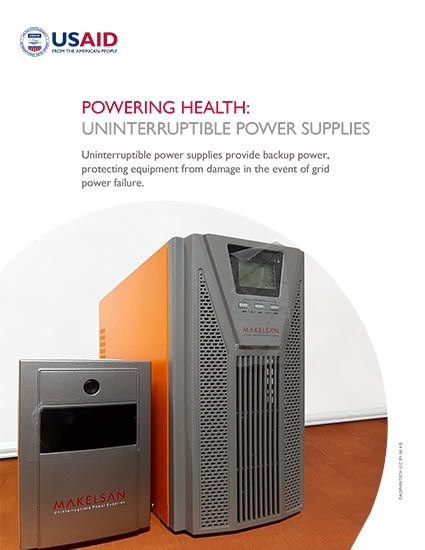Uninterruptible power supplies provide backup power, protecting equipment from damage in the event of grid power failure.
An uninterruptible power supply (UPS) is a type of device that powers equipment, nearly instantaneously, in the event of grid power failure, protecting the equipment from damage. UPS systems vary significantly in their design and functionality, affecting the amount of time they can power equipment, their ability to improve power quality, and their cost.
Data servers, computer systems, industrial settings, and laboratories commonly use UPS systems. Because a UPS protects equipment, it is appropriate for any situation where electrical loads may be sensitive to power loss or other power quality issues. For example, UPS systems are commonly used for computers and servers because power loss to these loads may result in loss of data or component damage.
Likewise, many types of medical and laboratory equipment are sensitive to interruptions in power supply or poor quality power. For many health facilities in developing nations, grid power is unreliable or of poor quality, resulting in scheduled or unscheduled power loss for large portions of the day or fluctuations in grid voltage that may adversely affect equipment. In addition, power loss in hospitals and laboratories leads to downtime, affecting the quality and availability of critical services. Thus, health facilities often employ backup power systems to meet electrical loads in the case of power loss from the grid.
UPS systems serve two main purposes. They provide backup power as quickly as possible in the event of power loss, and they offer some degree of protection from power quality issues that may damage equipment. UPS systems fulfill these goals to varying degrees depending on their design and features, which ultimately affect their costs.
Types of Uninterruptible Power Supplies
UPS systems provide a comprehensive, modular solution to protecting sensitive equipment from power supply problems. Depending on power quality issues to be addressed, three types of UPS systems are used:
- Double conversion or online UPS
- Standby or off-line UPS
- Line-interactive UPS
Power Quality Issues
Power quality refers to the adequacy of a power supply in terms of voltage, frequency, and waveform characteristics. Electrical equipment is designed to use electrical power with certain characteristics, such as 12 or 24 volts, or when designed for alternating current (AC) power, 50 or 60 hertz (Hz) frequency. Similarly, power supplied by the grid, or some other source such as a generator or battery bank, is intended to meet a certain voltage level or frequency. Typical issues associated with power quality include:
- Power interruption
- Voltage sag/undervoltage
- Voltage swell/overvoltage
- Voltage transient/spike/surge
- Noise
- Harmonic distortion
UPS Terms
When selecting an appropriate UPS system for health facility applications, it is useful to have a basic understanding of the common terms and features that may be encountered when selecting UPS products.
- Run time
- Automatic data network shutdown
- Battery extensions
- Data port
- Bypass switch
- Delta conversion
- EMI/RFI noise filtering
- Transfer time
- Cold start operation
- Hot swappable batteries
- Battery recharge rate
- Voltage transfer set points
- Efficiency
- Redundancy
- Number of outlets
Sizing and Selection
Given the range of options for backup power and power quality equipment, selecting the most appropriate choice for a health facility requires a careful examination of the facility’s loads, power supply, and energy management capacity. Important questions to consider include the following:
- How large are the sensitive equipment loads compared to the total facility load?
- Which power supply issues does the facility face—quality, availability, both?
- What resources are available to manage and maintain energy equipment?
Maintenance
The maintenance required for UPS systems is generally minimal. Battery health is the greatest concern in ensuring the overall effectiveness of a UPS system. Confidence in the UPS system’s ability to provide necessary run time depends on good battery maintenance. Maintaining UPS batteries entails periodic cleaning and testing as well as proper replacement at the end of the battery’s life.
Additional Resources
-
USAID
Analyze Energy Demand and Supply
Before investing in any energy technologies, a health facility must first understand its current day-to-day energy requirements. An initial energy audit is critical to ensuring proper system design and operation. Learn more
-
Energy Audit
An energy audit helps develop an inventory and pattern of operation of energy equipment within a health facility, which enables the cost-effective planning and management of energy supply systems. Learn more
-
USAID
Batteries and Battery Management
Batteries provide backup power during gaps in electricity generation. They are critical for some energy systems but are expensive and may require maintenance or replacement. Learn more
-
Timothy Quill (CC BY-SA 4.0)
Uninterruptible Power Supply Standards
Many organizations have established standards that address uninterruptible power supply safety, performance, testing, and maintenance. View the standards


Comment
Make a general inquiry or suggest an improvement.